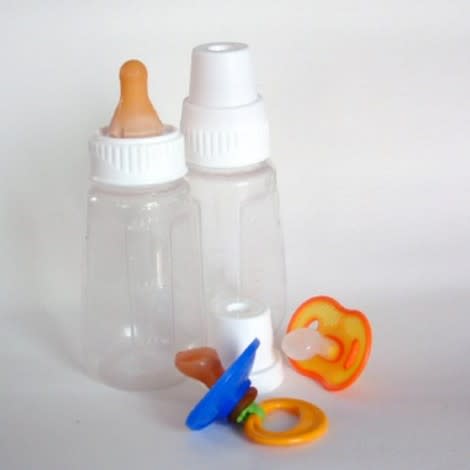The Real Reason Moms Fail to Breastfeed

Researchers at UC Davis Medical Center revealed what new moms have known for centuries: breastfeeding just isn't easy.
A study conducted by UC Davis revealed that only 13 percent of new moms breastfeed for the recommended six months.
NPR reported, "Three days after giving birth, 92 percent of the new mothers said they were having problems breast-feeding. Half of the mothers reported problems with getting the baby to latch on to the breast, or other feeding issues like nipple confusion, when a baby may prefer a bottle. And 44 percent said pain was a problem. And 40 percent said they felt that they weren't producing enough milk."
Those reasons were the same reasons cited when the mothers quit nursing. The study also found that the moms who were successful at nursing had a strong support system. The moms who quit lacked adequate resources.
Related: 17 foods to avoid while breastfeeding
Too all of this, I say: No lie.
With my first child, I quit breastfeeding after two painful, blood-filled months of anguish. My daughter loved the bottle and I didn't have the energy to call the lactation consultant, yet again, when she finally gave up nursing when I went back to work. But with my second child, I was determined to make breast feeding happened. When I struggled the first week, I called the hospital's lactation consultants and requested a home visit. And yet, even that wasn't enough. The lactation consultant took one look at me nursing and dismissed all my pain and worry with a "you will be fine."
My mom, who has breastfed seven children, was my savior. She came to visit when my son was a week old. She took one look at my boobs and demanded I go see a doctor. As it turned out, I had mastitis. After getting on an antibiotic, my mom showed me different ways to get my son to latch. For the entire eight days she visited, she showed me how to adjust positions, latch and relatch. She took care of my daughter and allowed me the time and space I needed to make breastfeeding work. She poured wine. Made dinner and got a pillow for my feet. Without her support, my son would be on formula.
And I say that, not to knock formula, but to point out that even as a second-time mom I needed a lot of help to make breastfeeding work. The lactation consultants at the hospital, were dismissive of my concerns and frequently advised me just to "feed through the pain." Not helpful.
Those first few weeks after a baby is born are rough. The exhaustion and the crazy-making hormones don't make conditions ideal for a woman to endure bleeding nipples and concerns about feeding and milk supply. It's no small wonder that the women who don't succeed don't have adequate help. A friend of mine, who also had mastitis her first week of breastfeeding, was told by the hospital lactation consultants to just take some Tylenol and put a cabbage leaf in her bra. She got an abscess and gave up nursing. I can't blame her.
Hospitals are working to help women breastfeed. Many hospitals have breastfeeding support groups and lactation consultants, but even then, resources are scarce and often lacking. With a health care system in shambles, it's no wonder the U.S. lags behind other developed nations for maternal support and breast feeding rates. Countries that have high rates of breastfeeding have better maternity leave policies, and better health care than the U.S. It seems counter intuitive that we live in a country that bemoans our poor health, and yet fails to enact policies that facilitate us making healthy choices. And in case you think I'm confusing the issue, breastfed infants are healthier and have lower obesity rates.
A healthier nation starts with healthier babies.
-By Lyz Lenz
For 7 powerful images of women of color breastfeeding, visit BabyZone!
MORE ON BABYZONE
5 common infant feeding issues... solved!
7 places to connect with other new moms
7 whole grains you should be feeding your baby

